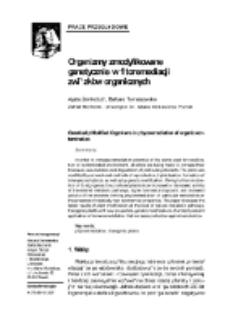- Search in all Repository
- Literature and maps
- Archeology
- Mills database
- Natural sciences
Advanced search
Advanced search
Advanced search
Advanced search
Advanced search

Object
Title: Genetically Modified Organisms in phytoremediation of organic contamination
Subtitle:
Genetically Modified Organisms in phytoremediation of organic contamination
Publisher:
Institute of Bioorganic Chemistry PAS ; Committee on Biotechnology PAS
Abstract:
In order to increase remediation potential of the plants used for recultivation of contaminated environment, attempts are being made to increase their tolerance, accumulation and degradation of particular pollutants. The plants are modified by conventional methods of reproduction, hybridization, formation of interspecies hybrids, as well as by genetic modification. Owing to the introduction of foreign genes, the produced plants show increased or decreased activity of the desired metabolic pathways, higher biomass and growth, and increased activity of the enzymes limiting phytoremediation of particular xenobiotics or the presence of relatively new biochemical properties. The paper discusses the latest results of plant modification at the level of natural metabolic pathways, transgenic plants with new properties, genetic modifications of endophytes and application of immunomodulation that increases protection against xenobiotics.
Relation:
Biotechnologia, vol.79, 4 (2007)-.
Volume:
Issue:
Start page:
End page:
Detailed Resource Type:
Format:
Resource Identifier:
0860-7796 ; oai:rcin.org.pl:75192
Source:
Library of Institute of Bioorganic Chemistry PAS
Language:
Language of abstract:
Temporal coverage:
Rights:
Creative Commons Attribution BY-SA 4.0 license
Terms of use:
Digitizing institution:
Institute of Bioorganic Chemistry of the Polish Academy of Science
Original in:
Institute of Bioorganic Chemistry of the Polish Academy of Science
Projects co-financed by:
Access:
Object collections:
- Digital Repository of Scientific Institutes > Partners' collections > Institute of Bioorganic Chemistry PAS > Articles
- Digital Repository of Scientific Institutes > Literature > Journals/Articles
Last modified:
Oct 2, 2020
In our library since:
Jul 18, 2019
Number of object content downloads / hits:
639
All available object's versions:
https://rcin.org.pl./publication/98941
Show description in RDF format:
Show description in RDFa format:
Show description in OAI-PMH format:
| Edition name | Date |
|---|---|
| Organizmy zmodyfikowane genetycznie w fitoremediacji związków organicznych | Oct 2, 2020 |
Objects Similar
Borkowska, Bożenna
Ziółkowski, Piotr Babula- Skowrońska, Danuta Kaczmarek, Małgorzata Cieśla, Agata Sadowski, Jan
Wójcik, Przemysław Tomaszewska, Barbara
Wasinkiewicz, Konrad Wojtera, Joanna Tomaszewska, Barbara

 INSTYTUT ARCHEOLOGII I ETNOLOGII POLSKIEJ AKADEMII NAUK
INSTYTUT ARCHEOLOGII I ETNOLOGII POLSKIEJ AKADEMII NAUK
 INSTYTUT BADAŃ LITERACKICH POLSKIEJ AKADEMII NAUK
INSTYTUT BADAŃ LITERACKICH POLSKIEJ AKADEMII NAUK
 INSTYTUT BADAWCZY LEŚNICTWA
INSTYTUT BADAWCZY LEŚNICTWA
 INSTYTUT BIOLOGII DOŚWIADCZALNEJ IM. MARCELEGO NENCKIEGO POLSKIEJ AKADEMII NAUK
INSTYTUT BIOLOGII DOŚWIADCZALNEJ IM. MARCELEGO NENCKIEGO POLSKIEJ AKADEMII NAUK
 INSTYTUT BIOLOGII SSAKÓW POLSKIEJ AKADEMII NAUK
INSTYTUT BIOLOGII SSAKÓW POLSKIEJ AKADEMII NAUK
 INSTYTUT CHEMII FIZYCZNEJ PAN
INSTYTUT CHEMII FIZYCZNEJ PAN
 INSTYTUT CHEMII ORGANICZNEJ PAN
INSTYTUT CHEMII ORGANICZNEJ PAN
 INSTYTUT FILOZOFII I SOCJOLOGII PAN
INSTYTUT FILOZOFII I SOCJOLOGII PAN
 INSTYTUT GEOGRAFII I PRZESTRZENNEGO ZAGOSPODAROWANIA PAN
INSTYTUT GEOGRAFII I PRZESTRZENNEGO ZAGOSPODAROWANIA PAN
 INSTYTUT HISTORII im. TADEUSZA MANTEUFFLA POLSKIEJ AKADEMII NAUK
INSTYTUT HISTORII im. TADEUSZA MANTEUFFLA POLSKIEJ AKADEMII NAUK
 INSTYTUT JĘZYKA POLSKIEGO POLSKIEJ AKADEMII NAUK
INSTYTUT JĘZYKA POLSKIEGO POLSKIEJ AKADEMII NAUK
 INSTYTUT MATEMATYCZNY PAN
INSTYTUT MATEMATYCZNY PAN
 INSTYTUT MEDYCYNY DOŚWIADCZALNEJ I KLINICZNEJ IM.MIROSŁAWA MOSSAKOWSKIEGO POLSKIEJ AKADEMII NAUK
INSTYTUT MEDYCYNY DOŚWIADCZALNEJ I KLINICZNEJ IM.MIROSŁAWA MOSSAKOWSKIEGO POLSKIEJ AKADEMII NAUK
 INSTYTUT PODSTAWOWYCH PROBLEMÓW TECHNIKI PAN
INSTYTUT PODSTAWOWYCH PROBLEMÓW TECHNIKI PAN
 INSTYTUT SLAWISTYKI PAN
INSTYTUT SLAWISTYKI PAN
 SIEĆ BADAWCZA ŁUKASIEWICZ - INSTYTUT TECHNOLOGII MATERIAŁÓW ELEKTRONICZNYCH
SIEĆ BADAWCZA ŁUKASIEWICZ - INSTYTUT TECHNOLOGII MATERIAŁÓW ELEKTRONICZNYCH
 MUZEUM I INSTYTUT ZOOLOGII POLSKIEJ AKADEMII NAUK
MUZEUM I INSTYTUT ZOOLOGII POLSKIEJ AKADEMII NAUK
 INSTYTUT BADAŃ SYSTEMOWYCH PAN
INSTYTUT BADAŃ SYSTEMOWYCH PAN
 INSTYTUT BOTANIKI IM. WŁADYSŁAWA SZAFERA POLSKIEJ AKADEMII NAUK
INSTYTUT BOTANIKI IM. WŁADYSŁAWA SZAFERA POLSKIEJ AKADEMII NAUK


































